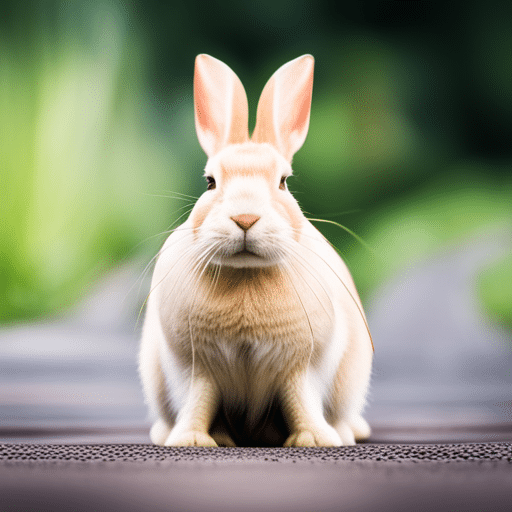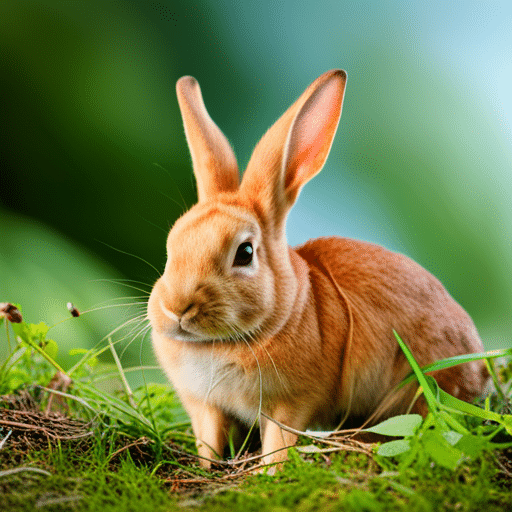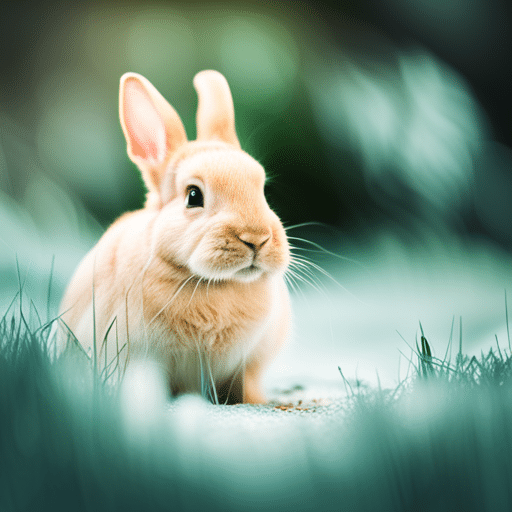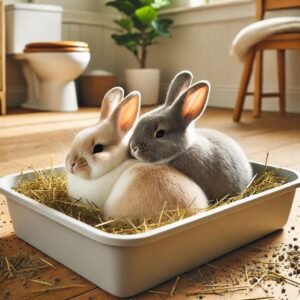Rabbits, with their twitching noses and floppy ears, are beloved pets for many. However, when a rabbit owner notices a change in their furry friend’s urine color – particularly a shift towards red – it can prompt a wave of concern. Is it a sign of a health issue or is it just a natural, harmless change? This comprehensive guide aims to address these concerns, delving into the various factors that can cause a rabbit’s pee to turn red and providing you with the information needed to ensure your pet’s well-being.
Understanding Rabbit’s Urinary System: An Overview

Understanding the phenomenon of a rabbit’s urine turning red requires delving into the intricacies of their urinary system. Rabbits have a pair of kidneys that extract waste products from the bloodstream and produce urine. This urine then travels through slender tubes called ureters, which transport it to the bladder for temporary storage until the rabbit is ready to urinate. Finally, the urine exits the body through the urethra, completing the intricate process of waste elimination in these fascinating creatures.
The Normal Color of Rabbit Urine: What to Expect?
The color of a rabbit’s urine can vary due to various factors, including diet, hydration, overall health, and environmental conditions. Typically, healthy rabbits have pale to clear urine, which can range from yellow to amber. However, it’s important to note that certain pigments in their diet, such as those found in carrots or beets, can subtly affect the urine color. For example, a rabbit that consumes a large amount of carrots may have urine with a slightly more orange tint. Similarly, changes in hydration levels can result in urine that appears more concentrated, dark yellow, or diluted. Dehydrated rabbits may have darker and more concentrated urine, while well-hydrated rabbits may have lighter and more diluted urine. Monitoring the color of a rabbit’s urine is crucial for owners as it provides valuable insights into their pet’s health and well-being.
Reasons Behind Red Rabbit Pee: An In-depth Look
While most rabbit owners are accustomed to seeing pale yellow or clear urine, a sudden change in color can understandably cause concern. There are several reasons why a rabbit’s pee may turn red, ranging from harmless causes to more serious underlying health issues.
1. Diet and Pigments

As mentioned earlier, certain pigments in a rabbit’s diet can affect the color of their urine. In most cases, this change is temporary and will resolve itself once the rabbit’s diet returns to normal. However, certain diets high in pigmented foods, such as beet greens or red cabbage, can cause more persistent changes in urine color. If you suspect that your rabbit’s diet may be the culprit behind their reddish pee, it’s best to consult with a veterinarian for guidance on adjusting their diet to a more balanced and healthier one.
2. Blood in the Urine

The presence of blood in a rabbit’s urine, also known as hematuria, can cause it to appear red or pinkish. This could be due to various underlying health issues, such as urinary tract infections, bladder stones, or kidney disease. If you notice consistently red or pink urine in your rabbit, it’s crucial to consult with a veterinarian for proper diagnosis and treatment.
3. Urinary Tract Infection (UTI)

Urinary tract infections (UTIs) are frequently observed in rabbits and can give rise to an array of symptoms, including urine tinged with blood. These infections occur when bacteria infiltrate the urinary tract and multiply, leading to irritation and inflammation. If left unaddressed, a UTI can lead to severe complications, underscoring the importance of promptly seeking veterinary care if you suspect your rabbit may be affected.
4. Bladder Stones
Bladder stones are hard masses of minerals that form in the bladder and can cause discomfort and pain for rabbits. As these stones rub against the walls of the bladder, they can cause inflammation and irritation, leading to blood in the urine. If your rabbit is showing signs of discomfort while urinating or has consistently red-colored pee, it’s essential to consult with a veterinarian for proper diagnosis and treatment of urinary bladder disease.
5. Kidney Disease
In rare cases, kidney disease can cause a rabbit’s urine to turn red due to blood leaking into the urine from damaged kidneys. This condition is typically seen in older rabbits, and symptoms may also include weight loss, decreased appetite, and increased thirst. If you suspect your rabbit may have kidney disease, it’s critical to seek veterinary care for proper management and treatment.
Health Conditions Causing Red Urine in Rabbits
Apart from the reasons mentioned above, there are other health conditions that can cause a rabbit’s urine to turn red. These include bladder cancer and urinary tract tumors. If your rabbit has consistently red or pink urine along with other symptoms such as weight loss, lethargy, or changes in appetite, it’s crucial to seek veterinary care for proper diagnosis and treatment.
How to Differentiate Between Normal and Abnormal Rabbit Pee
As responsible rabbit owners, it is vital to have a comprehensive understanding of the difference between normal urine, and abnormal urine color in our furry companions. While temporary changes in pigment can occur due to diet or hydration, it is crucial to note that persistent red-colored urine should raise concerns as it may indicate an underlying health issue. Therefore, it is of utmost importance to diligently monitor your rabbit’s urine color regularly and promptly seek professional veterinary care if you notice any unusual or alarming changes. By taking a proactive approach, we can ensure the well-being and overall health of our beloved rabbits.
When to Consult a Vet: Red Rabbit Pee and Your Pet’s Health.

As mentioned earlier, changes in a rabbit’s urine color can be due to various factors, including diet, hydration, and underlying health issues. While slight variations in urine color may not necessarily warrant a trip to the vet, persistent red or pink pee should never be ignored. It’s crucial to seek immediate veterinary care if your rabbit has consistently red-colored urine along with any other concerning symptoms, such as changes in appetite or behavior. By consulting with a professional veterinarian, you can ensure that your rabbit receives proper diagnosis and treatment to maintain their health and well-being. Remember, prevention is always better than cure, so it’s essential to monitor your rabbit’s urine color regularly and seek veterinary care if you notice any significant changes. With proper care and attention, we can ensure that our beloved rabbits live a happy and healthy life. So, as responsible pet owners, let’s prioritize our furry friends’ health and take action when needed to keep them happy and thriving. After all, a healthy rabbit is a happy rabbit! Keep a watchful eye on your bunny’s pee color and consult with a vet if any concerns arise.
Tips for Maintaining Your Rabbit’s Urinary Health
Taking preventive measures is always preferable to dealing with health issues later on. When it comes to maintaining your rabbit’s urinary health, there are several proactive steps you can take. These include:
Providing a balanced diet with plenty of fresh hay, vegetables, and limited amounts of pellets.
Ensuring access to clean water at all times to prevent dehydration.
Regularly cleaning and maintaining their living space to minimize the risk of infection.
Monitoring urine color and consistency regularly to detect any changes promptly.
If you observe any worrisome alterations in your rabbit’s urine or overall well-being, it is imperative to promptly seek veterinary care.
By following these tips and being proactive about your rabbit’s urinary health, you can help prevent potential issues and ensure that your furry friend stays healthy and happy. Remember, a little effort goes a long way when it comes to keeping our beloved rabbits in the best of health. So, don’t neglect your rabbit’s urinary health – be vigilant and take prompt action if needed. Together, we can ensure that our furry companions live long and fulfilling lives! Happy bunny parenting! Keep those happy tails wagging!
Conclusion: Understanding and Caring for Your Rabbit’s Pee.
In conclusion, a rabbit’s urine color can provide valuable insight into their overall health and well-being. While variations in color may occur due to diet or hydration, consistently red or pink urine should raise concerns and prompt a visit to the veterinarian. By understanding the potential causes of red urine in rabbits and taking proactive measures for maintaining urinary health, we can ensure that our beloved pets live long and healthy lives. Remember to provide a balanced diet, access to clean water, and monitor urine color regularly to keep your bunny happy and thriving. And if you ever notice any concerning changes in your rabbit’s pee, don’t hesitate to seek professional veterinary care. With proper attention and care, we can ensure that our furry companions live their best lives! So let’s keep those little tails wagging and give our rabbits the love and care they deserve! Happy bunny parenting everyone! Keep those happy bunnies hopping!
Thank you for reading!
We hope this document has provided valuable information on red urine in rabbits and how to maintain your bunny’s urinary health. Remember, being proactive about your rabbit’s well-being is crucial, so don’t hesitate to consult with a veterinarian if you have any concerns. By taking good care of our furry companions, we can ensure that they live long and happy lives by our side! Happy bunny parenting everyone! Keep those happy tails wagging! And always remember – a healthy rabbit is a happy rabbit!



